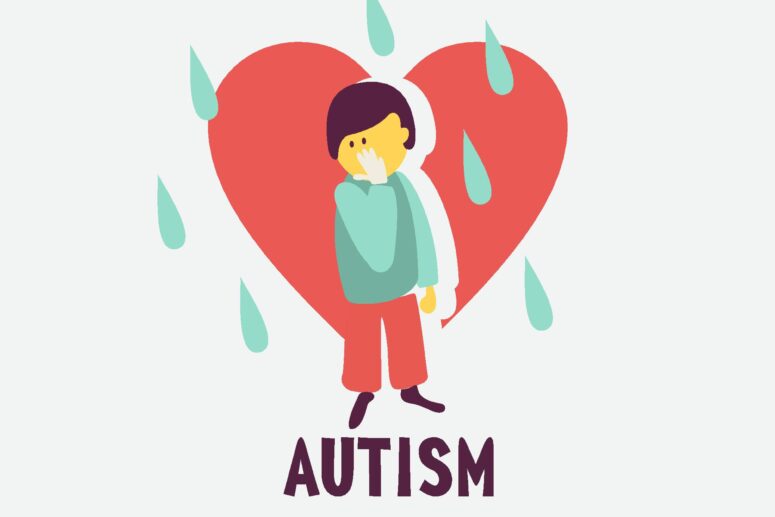
Table of Contents
Autism spectrum disorder (ASD) or autism is a developmental disability that is both very common and highly misunderstood. ASD is caused by differences in the brain and can often lead to challenges with social interactions, learning, moving, paying attention and other life skills.
However, sometimes it can be difficult to diagnose this disability. Here are some of the signs and symptoms to look for.
Causes of Autism
The exact cause of ASD is still unknown, and most experts agree there is no single cause. However, there are certain risk factors that may lead to autism, including genetics. Autism can run in families or be caused by a fragile X syndrome.
There are other factors commonly linked to ASD including:
– Being born to older parents
– Low birth weight
– Metabolic imbalances
– Exposure to environmental toxins and heavy metals
– Maternal history of viral infections.
Essentially, experts believe that both genetics and environment can impact a person’s chances of developing ASD.
Symptoms of Autism
The symptoms of autism can vary from person-to-person, but these are the most common signs to look for across different ages.
Babies
It can be difficult to diagnose babies with autism, as so many of the common signs and symptoms don’t present until children are old enough to socially interact with adults. The most common symptom of autism in babies is a lack of eye contact.
Other symptoms that may indicate autism include:
– Showing no or less response to a parent’s smile
– Not looking at objects that parents point to or look at
– Failing to point at objects
– Abnormal facial expressions
– Not talking by 15 months
However, a lack of eye contact isn’t the only sign or symptom to look for, so make sure to talk to your pediatrician first.
Children
Individuals with autism are most commonly diagnosed when they are children. There are several signs that may indicate your child should be checked for autism. This includes:
– Not responding to their name
– Not smiling when they look at you
– Repetitive body movements
– Not interacting with other children
– Difficulty making and keeping fiends
– Not showing empathy
If you have noticed these symptoms in your child, then you should contact your doctor for more information.
Adults
Even though many individuals are diagnosed with autism before they reach adulthood, this isn’t always the case. There are many adults who aren’t diagnosed until later in life. Some of the signs and symptoms of autism in adults include:
– Difficulty regulating emotions
– Frequently stating monologues on the same subject
– Difficulty reading other people’s emotions
– Trouble maintaining conversations
– Discomfort during eye contact
– Extreme interests in only one topic
– Difficulty making or maintaining close friendships
– Getting too close to other people
– Getting upset if someone touches or gets too close to them
These types of social challenges in adults can be an indicator of undiagnosed autism.
Areas That Autism Can Affect
If you aren’t already familiar with autism, then it may be difficult to determine which areas of life this disorder can impact. While autism is a spectrum and can influence different people in different ways, these are some of the most common ways this condition can impact individuals in their day-to-day life.
Social Interactions
This is perhaps the most recognizable way autism can impact older children and adults. It can be very difficult for someone with autism to understand boundaries, social “rules” like not talking over people, or how to make and keep friends.
Repetitive Behaviors
Repetitive behaviors, or stims, are one of the hallmark features of ASD. Many individuals with this condition engage in repetitive motor movements such as hand flapping, fidgeting or rocking. Some individuals with autism will also say certain words on repeat or have repetitive vocalizations.
Anxiety or Excess Worry
Anxiety is a lesser-known impact for those with ASD, but generalized anxiety is actually one of the most common comorbid conditions associated with autism. When anxiety is able to be treated in those with autism, it can actually help with some social challenges and repetitive behaviors.
Delayed Cognitive Skills
Some children with autism have delayed cognitive skills, many of which are similar to those seen in children with attention deficit hyperactivity disorder or ADHD. However, even though some children with autism have certain learning challenges particularly with paying attention, they often also have cognitive strengths, such as an acute attention to detail.
Unusual Eating or Sleeping Habits
Many individuals with autism will possess unusual eating habits including limited food preferences and hypersensitivity to food textures and temperatures. Sleeping also tends to be a challenge, as many individuals with autism struggle to fall asleep and stay asleep on a nightly basis.
How ABA Therapy Can Help Your Kid With Autism
Identifying the signs and signals of Autism is only half the battle. Parents of children with Autism should also be exploring some of the different therapies available. The right therapy can help individuals with Autism overcome some of their challenges and learn to thrive in their day to day lives.
The key is not “curing” autism, as there is no cure, but helping those with ASD possess the skills they need to limit autism’s impact on their lives.
One of the most researched and effective forms of therapy for individuals with autism is known as Applied Behavior Analysis, or ABA, therapy. This therapy teaches individuals with ASD functional behaviors and new skills by promoting appropriate behaviors and discouraging inappropriate ones.
Here at Golden Care Therapy, we provide in-home autism services to children and their families utilizing ABA therapy. Our goal is to help children with Autism to possess the mental, physical and emotional skills they need to live their best lives possible.
If you are ready to work with the best ABA therapy provider in Indiana, New Jersey, or New York, give us a call at (732) 402-0297. Our dedicated team is ready to help and we will treat you like family.
- Interview with Kaitlyn Pietrobono - April 19, 2024
- Interview with Yakimah Lucas, BT - March 19, 2024
- Interview with Kimberly Woolery, BCBA - March 19, 2024
